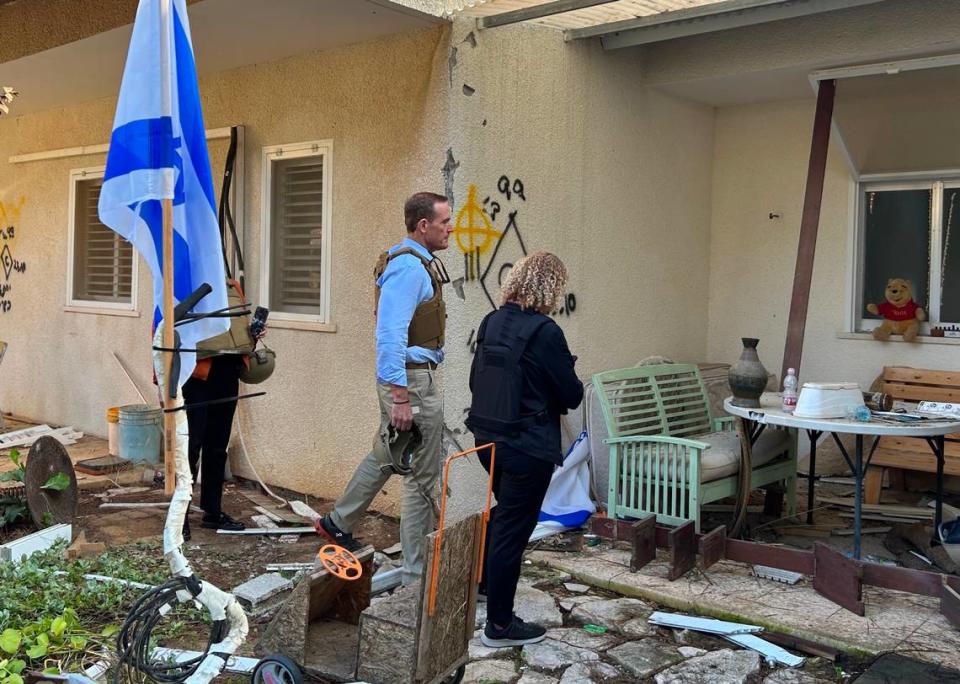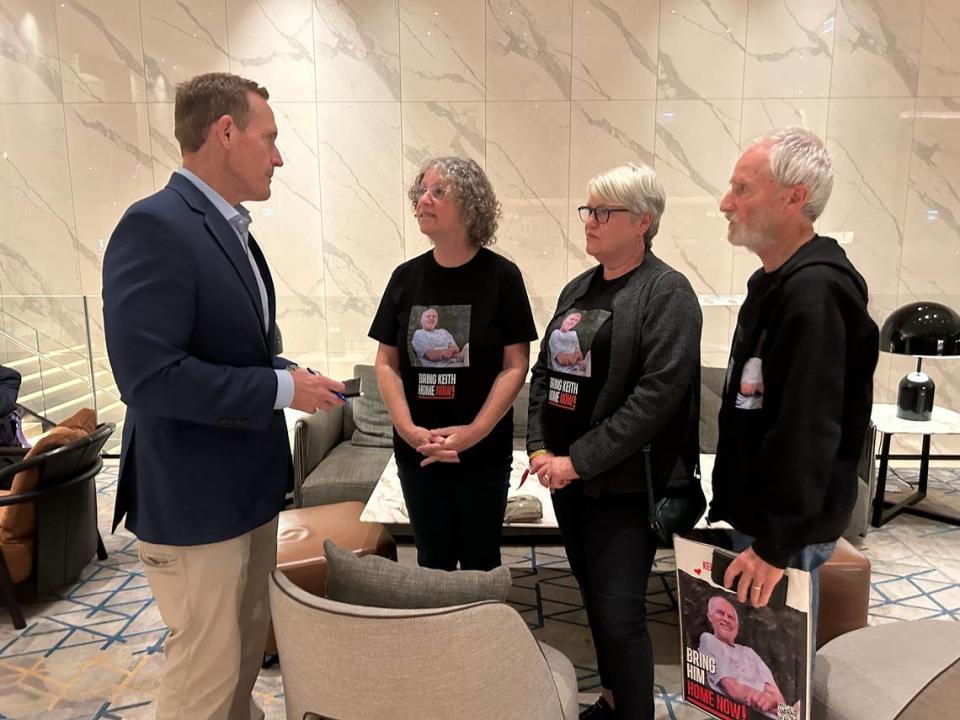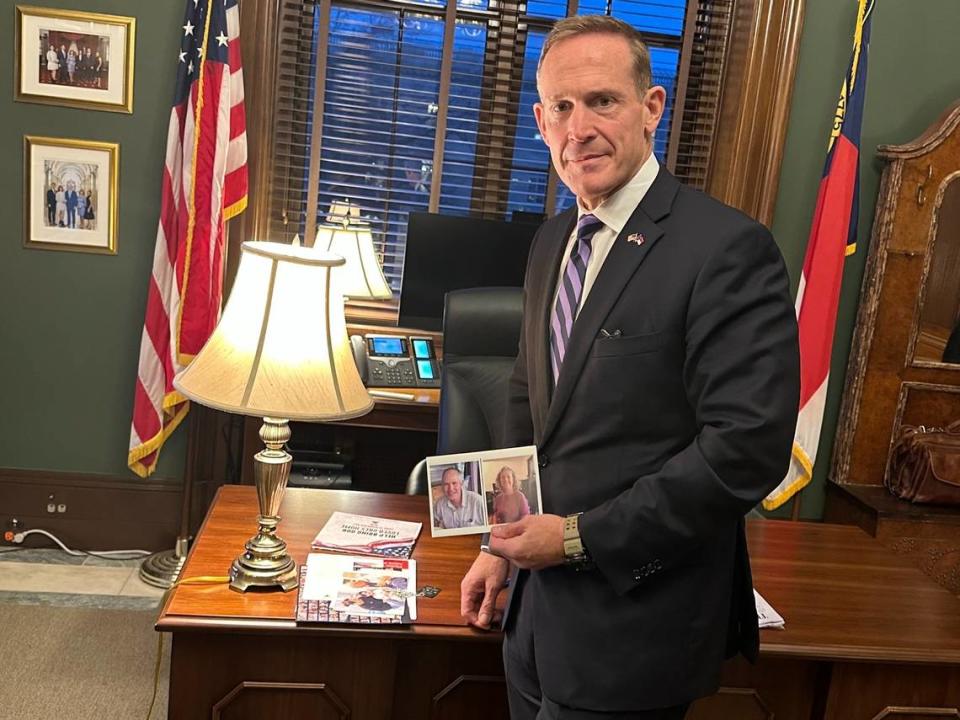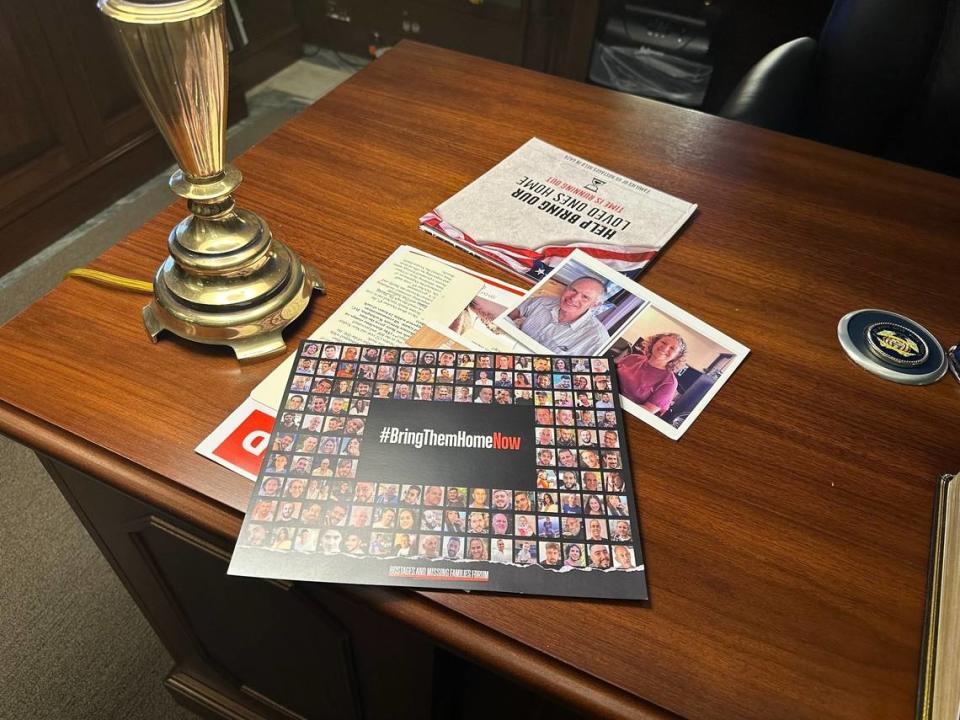NC’s Sen. Ted Budd witnessed ‘capacity for evil’ during trip to Middle East
- Oops!Something went wrong.Please try again later.
Content warning: This story includes references to sexual violence.
The emotion was palpable across Sen. Ted Budd’s face as he thought back to what he witnessed during a recent trip to a kibbutz in Israel.
“Imagine a series of duplexes, small homes with lots of flowers, toys, tricycles: burned,” Budd told McClatchy in an exclusive interview.
He saw doors blown out and walked over the broken glass from windows that were once part of the house.
“And the paint on the wall is completely littered with shrapnel,” Budd said, the words catching in his throat.
His lip quivered and the hint of a tear formed in the corner of his eye as he kept talking about his trip.

Over the weekend, Budd visited Israel, Egypt, Qatar and Bahrain on a trip led by Sen. Joni Ernst with members of both parties and both chambers of Congress. During the trip he met with family members of hostages taken by Hamas during the Oct. 7 attack on Israel. He toured a kibbutz ransacked by a group the United States deems a terrorist organization. He also met with Israeli, Qatari and Egyptian leaders, demanding their help in getting the 129 people being held hostage released.
Budd said he toured Kibbutz Nir Oz, a community a mile and a half from the Gaza Strip, then went to the 12th floor of a high-rise where the members of the kibbutz had moved and met with family members of those being held hostage.
Hiding from the attack on Israel
That included Adrienne “Aviva” Siegel, the wife of Chapel Hill native Keith Siegel.
On Oct. 7, Hamas brutally attacked Israel, killing 1,200 people and taking more than 240 hostage. It led to an attack in response by Israel and a death toll that continues to climb. The Palestinian Ministry of Health in Ramallah said Monday that at least 22,835 people have been killed in Gaza, CNN reported.
Many of those killed in Israel were attending a concert. Others were in their homes trying to hide in shelters from the attack.
“It’s important to understand that a bomb shelter for them is not what we would think of as a tornado shelter in the Midwest, or a bunker,” Budd said.

He described the shelters as a room with a sliding plate to cover a window and a hardened door to prevent shrapnel from nearby exploding bombs. He said it wasn’t meant to withstand rocket-propelled grenades. And he said it is really not meant to withstand grenade after grenade.
Budd said families would go into their shelters, but keep someone on the outside to act as a defense against Hamas.
“So imagine, mothers and daughters being in there while someone’s out there fighting and then someone’s taken and they don’t know what’s happened to their loved one, but they can hear their home being destroyed and abused and broken and ransacked,” Budd said.
The Siegels’ kibbutz was attacked. Their adult children knew that the next-door neighbor of their parents had to fight off Hamas, but wasn’t sure what had happened to their parents. Later, army intelligence would discover the Siegels had been taken while driving.

Held hostage in Gaza
Budd has advocated to bring the Siegels home. He said his passion for that cause comes partly from his own knowledge of Israel. He’s been traveling to the country since 1998. He’s been three times since becoming a senator last year. He studied theology and took four years of ancient Hebrew.
Budd added that the Siegels’ story stands out to him, not only because Keith is from Chapel Hill, with continued ties to the community, but as far as he knows this is the only situation in which a U.S. couple was taken hostage and only one of them was released.
“There’s this breadth of humanity that is tremendously good, and yet there is the capacity for evil beyond our normal everyday belief,” Budd said. “I witnessed it once again.”
Budd said only in the past 10 days has Aviva been comfortable talking about the horrors she endured while held underground. On Tuesday, she testified in Israel in graphic detail about her experience.
She also shared her story with Budd when he visited the country.
Budd said she was strong and resilient when speaking with him and took comfort from being with others from the kibbutz. But he added he only saw her in her public moments. He doesn’t know how she’s handling in private what she’s endured.
And he added that she’s worried about her husband.
She and Keith were forced to lie side-by-side in the underground tunnels but were not allowed to speak, even a whisper, to one another.
“She was made to lay there on her back,” Budd said. “She wasn’t allowed to get up, go to the bathroom, they had minimal food. I think she lost 30 pounds.”
Budd said Aviva told him the hostages were being given very little water and they weren’t allowed to turn over.
“It was like 20 hours of lying in the same spot,” Budd said. “Then they would be hustled to a new location.”
Budd said Aviva was moved 13 times while held in captivity. He said she witnessed sexual violence and a person lying next to her being tortured.
“She was grateful that she was a bit older because she witnessed sexual violence underground,” Budd said. “She was shocked at the fact that so many people don’t believe that anything happened or didn’t happen as said, and there’s so much denial of the atrocities.”
Aviva was released by Hamas during a temporary, agreed-upon humanitarian ceasefire. Keith was not. Also released was 4-year-old Abigail Mor Edan, an American dual citizen. Budd said it was Aviva who carried Abigail out of captivity.
Budd said he sensed the greatest burden on each family member is the unknown.
When Aviva left Keith he was still alive but weak. He wasn’t being provided his daily blood pressure medicine or basic needs. Budd said the Siegels told each other to stay strong as they were separated.
Israel’s response
In Israel, Budd also met with President Benjamin Netanyahu.
Israel’s response to the attack by Hamas has led to controversy in the United States. Since Oct. 7, pro-Palestinian
protesters have called for a ceasefire by Israel. Some protests have snarled traffic. During the holidays, those protesters blocked access to malls during major shopping days. They blocked airport access on busy travel days.
Earlier this week, traffic was snarled trying to go in and out of Manhattan by protesters blocking bridges and tunnels into New York City.
In response, Republican Sens. Thom Tillis and Marsha Blackburn, of North Carolina and Tennessee, respectively, filed a bill this week to make it a federal crime to block traffic during protests.
Budd said Netanyahu compared what happened in Israel to that of 9/11, but coupled with continued torture, sexual violence and psychological warfare. Budd told McClatchy that Aviva and other released hostages told him that the hostages are being told there’s no point in coming out of the tunnels, because Israel is gone, Hamas has taken over and everything they knew about life above ground is different.
Budd said: “They want to destroy Hamas — and Bibi has been very clear about what his three goals are — he wants to demilitarize Gaza and he wants to de-radicalize the Palestinian population.”
He added that he believes Netanyahu wants an Arab-led solution for the West Bank, particularly in Gaza. He said that the population is very dense and from birth people are indoctrinated to hate Israel and the Jewish people.
“I think they want to do everything they can to minimize noncombatant fatalities,” Budd said. “They’re doing what they can there, but it’s a very difficult balance.”
Amnesty International, a human rights organization, describes the response from Israel as a “relentless Israeli bombardment” and said it’s led to the deaths of thousands of civilians “through indiscriminate and other unlawful attacks.” The organization adds that more than a third of the casualties in Gaza are children.
Applying pressure
Budd said his goal in meeting with foreign dignitaries was to ensure they understood the importance in working toward the release of the hostages.
Budd met with the prime minister of Qatar. He said Ernst led that meeting, where they first thanked the prime minister for what he had done, but then asked tough questions.
“We wanted to express gratitude and yet we wanted to say, ‘We believe you have more power and more leverage and we want you to do more,’” Budd said. “We were very clear that we want these hostages returned, and we think they have more capacity than they’re actually utilizing now.”
Budd said this conversation came on the heels of one he had in his Senate office with the Qatar ambassador several weeks earlier that was very terse and he described as “not a pleasant meeting.”
He said in Qatar, they tried to balance friendly relations and keeping pressure on the Qataris during a state dinner, and believes they struck the right balance.
“I think it’s important to show that while we can have tough conversations, we can have a relationship,” Budd said.
Budd also had conversations with Egyptian leaders asking for a continued partnership in negotiations.
Budd’s desk is immaculately clean and he is a subscriber of the inbox zero philosophy, but he makes an exception when it comes to keeping items on his desk that reminds him of his fight to bring the hostages home.

There’s a book about the six Americans being held by Hamas.
There’s a photo gallery of all 129 hostages.
There’s a dog tag that reminds its owner about the rally cry to bring home the hostages.
Budd said he’s not going to let the pressure off until the hostages are released.

